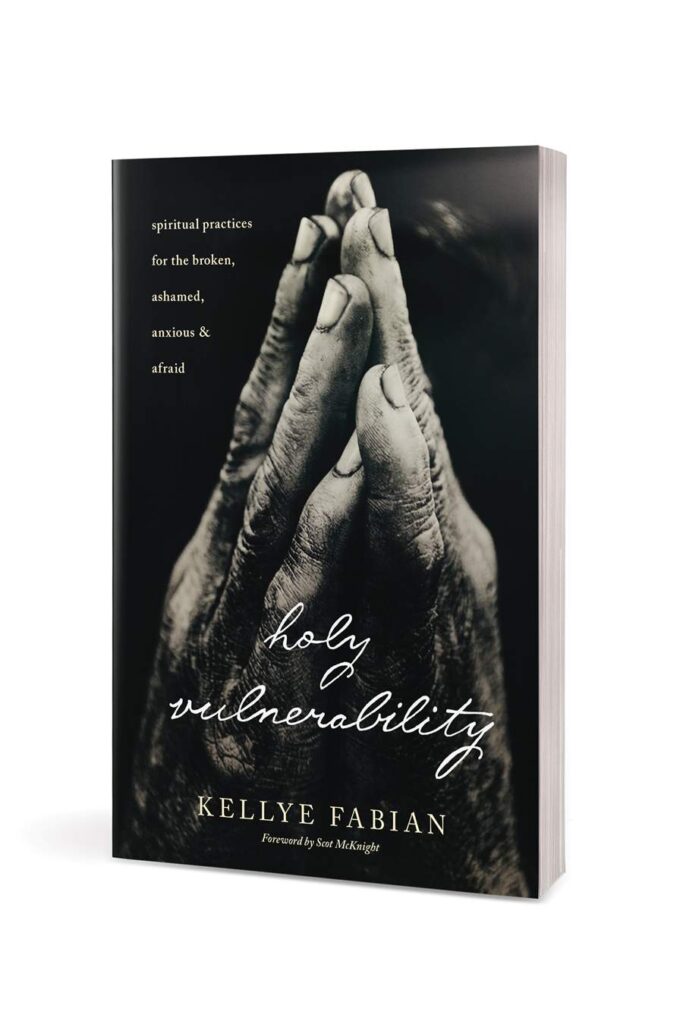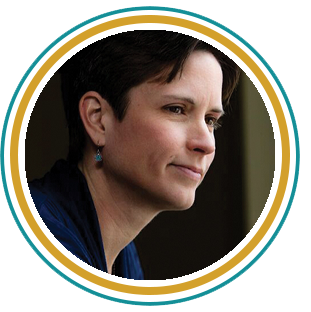The negative and life-diminishing ways we manage our brokenness and uncomfortable emotions are physical—things we do with our bodies in hopes of making our minds and hearts feel better. We can tell that these coping practices are unhealthy because they never lead us into true nourishment and life—which, ultimately, is trust in and dependence on God. But here’s the good news: Our bodies also offer restorative and healthy paths to actually enter into God’s presence more fully and opening us to his healing and transformation. And if we look at Scripture, we can find the amazing reality that this is God’s desire and design for us.
For the last four years, I have been studying the apostle Paul’s letter to the churches in Rome, and Paul’s words in Romans 12:1-3 are never far from my mind. They have been there when I wake up, in moments of impatience, sadness, anxiety, shame, and fear. They have come up as I’ve pondered divisive comments I see on social media, and even most recently, as I reflect on the worldwide pandemic caused by the coronavirus. In these three verses, Paul is telling us something critical about the role of our bodies and our ability to encounter God and be transformed. I know it’s tempting to skip over block quotes, but try reading this passage slowly and see if there’s anything specific you notice:
I urge you, brothers and sisters, in view of God’s mercy, to offer your bodies as a living sacrifice, holy and pleasing to God—this is your true and proper worship. Do not conform to the pattern of this world, but be transformed by the renewing of your mind. Then you will be able to test and approve what God’s will is—his good, pleasing and perfect will.
. . . Do not think of yourself more highly than you ought, but rather think of yourself with sober judgment, in accordance with the faith God has distributed to each of you.
Romans 12:1-3, NIV
So much meaning, instruction, and depth! Certainly I would have wanted whomever was reading this letter aloud the first time (probably Phoebe; Romans 16:1) to go back and read these words again and again. After all, Paul is speaking to Christians in this letter. They have already made that first decision to follow Jesus. They had likely left generational traditions and beliefs and were putting themselves at risk as Christians in Rome. And they had assented to certain truths about Jesus. Knowing all they had already sacrificed, though, Paul instructs them to offer even more. The word body (sōma) is not limited in the ways we might think today. It is intended to include the “entire person in all its created vibrancy and aliveness.”[i] Paul is urging Christians to turn over their whole selves, holding nothing back.
The Body Must Be Involved
But we must also assume he uses bodies for a specific purpose: acknowledging that after deciding to follow Jesus, humans don’t become disembodied, spiritual beings. Humans must deal with the fact that, as theologian N. T. Wright says, they live “within the world of space, time, and matter” and “within the multiple pressures and temptations that this places upon us.”[ii] To be a follower of Jesus is not about merely holding a set of beliefs but allowing those beliefs to shape entirely what our bodies do. Our faith, as our lives, is to be embodied.[iii]
Paul goes further with this point, instructing us not to “conform to the pattern of the world.” The “pattern of the world” during Paul’s day meant the way of the Roman Empire. New Testament scholar Scot McKnight describes what this would have been:
Embattled competition for honor and status and glory, of idolatries formed in the dust of suppressing knowledge of God as Creator, of sexual indulgence outside the Creator’s norms, of rebellion against Roman authorities, and most especially of any life that is not determined by love.[iv]
This is no different than the way of our world in the twenty-first century, at least in the West. And God calls us today, as he called first-century Christians, to live differently from the rest of the world. Followers of Jesus should look different not just because of what we believe but because what we believe dictates what we do with our bodies on a daily basis. This is no easy endeavor, of course. Indeed, Paul began this part of his letter by telling the Roman Christians that to live this way would be a sacrifice that they’d have to choose to offer. So it is for us. We will find ourselves struggling not to allow ourselves to get caught in the pattern of the world—its ways of thinking; approach to others; views of sexuality; values and primary concerns; and ways of acting in times of plenty and in times of hardship. When we employ our coping practices, isn’t this precisely what we’re giving into? The patterns of the world?
So how do we remain open to God, even in the midst of our own brokenness, shame, anxiety, and fear? How do we resist what the world tells us will help? Listen to the last of Paul’s words in this passage: “Do not think of yourself more highly than you ought, but rather think of yourself with sober judgment, in accordance with the faith God has distributed to each of you.” Paul is reminding his listeners first that they are human, living in limited, created, and sustained-by-God bodies, and that they are no more valuable than their fellow humans, who are limited and sustained in the same ways.
Paul is saying something else here as well. When he speaks of “the faith God has distributed to each of you,” he does not mean the amount of faith a person has. Rather, he’s referring to the spiritual gift each particular person has been assigned within the larger “body”—the church.[v] The “how” of opening to God’s presence begins with humility—as Scot McKnight puts it, “seeing oneself through God’s assignment for one in the Body of Christ” and acting in that role.[vi] Humility is a posture of the mind and of the body. Thinking you are open isn’t quite enough; the body must be involved.
This is why just after Paul tells us to offer our bodies as a living sacrifice, he spends pages listing out various ways of behaving: living in harmony with one another, honoring others above yourself, working hard, rejoicing, being patient, helping those in need, and practicing hospitality, among many others. But these lists are not, as is often thought, to be taken as tasks Christians are to do. Rather, these are ways of being that open us to God’s presence and transformative work.
Bodily Surrender as the Pathway to Healing
Let’s consider, then, what this means for our places of brokenness, shame, anxiety, and fear. Negative coping mechanisms cause us to avoid God’s transforming work. But these things Paul is talking about—these positions of the mind and body that open us to what God wants to do—what if they’re the pathway to healing the most vulnerable parts of our souls?
I don’t know about you, but these ways of being Paul is talking about aren’t what I would have thought of first in my desire to encounter God. And I certainly wouldn’t have thought they’d increase my chances of finding healing in the wounded parts of myself. What Paul is talking about seems, too, I don’t know, external and others-oriented to meaningfully address something so internal and personal. I have long thought of opening to God as a matter of will, a decision that I make in my quiet space alone at home. I have presented myself to God in prayer and, with my words, surrendered my whole self—body, mind, and soul. I have meant it sincerely. I have deeply longed for God to change whatever needed to be changed, to take whatever he wanted to take.
But it turns out that surrender doesn’t happen by internal decision alone, absent the participation of the physical body in the church body. Sure, in the face of fear, I can yell, “I’m not afraid anymore!” like Kevin McAllister did at the furnace in Home Alone. I can say, “I trust God completely” (and mean it). But encountering God requires more than mental assent. Or, put differently, in order to truly open spiritually, we need to engage with the world physically.
As we engage our bodies, inviting God into these movements, I suspect something is going to happen to us. We are going to become more vulnerable—open to the possibility of harm—in order for God to heal and mend and transform us. It’s not going to be safe. And it’s not going to be predictable. I cannot know how you will encounter God and what specifically God will do in you (or in me, for that matter). But what I do know is that as we turn away from our coping practices and toward the life-giving paths God offers us, our hearts will become increasingly surrendered, humble, free, grounded, generous, and connected. We are going to be less broken, ashamed, anxious, and afraid. Together, we are going to have to trust the Holy Spirit’s work in this. Whatever does happen (whether we notice it immediately or down the road) will be more good than any substitute we might be tempted to try.
As Paul might say: “Who will free us from these lives marked by brokenness, shame, anxiety, and fear? Thank God! The answer is in Jesus Christ our Lord. Amen!”[vii]
[i] Richard N. Longenecker, The Epistle to the Romans, New International Greek Testament Commentary (Grand Rapids, MI: Eerdmans, 2016), 920.
[ii] N. T. Wright, “Romans Commentary” in The New Interpreter’s Bible Commentary, vol. IX (Nashville: Abingdon Press, 2015), 606.
[iii] Scot McKnight, Reading Romans Backwards: A Gospel of Peace in the Midst of Empire (Waco: Baylor University Press, 2019), 30.
[iv] McKnight, Reading, 30–31.
[v] McKnight, Reading, 36.
[vi] McKnight, Reading, 36.
[vii] See Romans 7:22-25.



